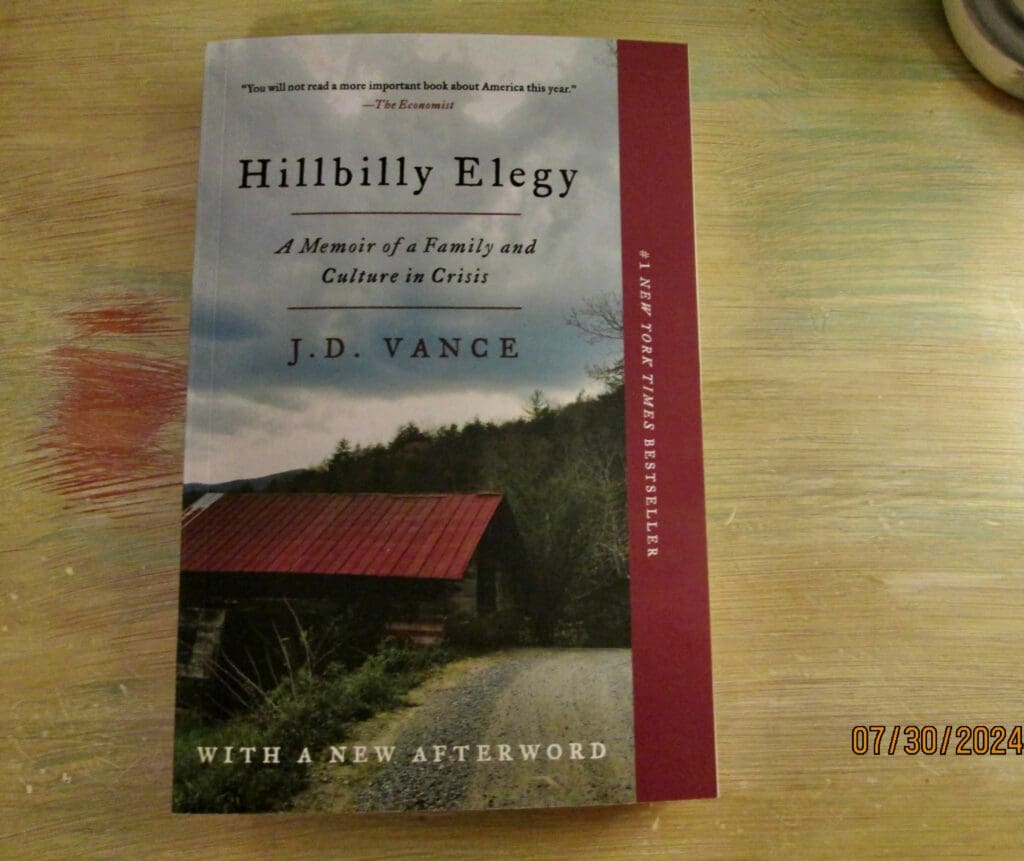
I am reading Hillbilly Elegy A memoir of a Family and Culture in Crisis, by J.D. Vance. I decided to read the book because he has been chosen to run for Vice President on the Republican ticket, and I wanted to know something about him.
It is the hardest book to read, that I have ever kept reading. The foul language is way over the top of anything that I have ever heard before and is offensive to anyone that stands on Biblical principles.
“Let no corrupt communication proceed out of your mouth, but that which is good to the use of edifying, that it may minister grace unto the hearers.” Ephesians 4:29
I have tried to tune out the words as much as possible and use the book as a study in sociology. I think J.D. Vance has spent his life doing the same kind of study. What I’m trying to understand is what makes people lazy, mean, unable to see themselves as they are, but seeing the faults of others. It makes me take a deep look at myself in all of this, too.
J.D. Vance came from an extremely poor, drug and alcohol abusive family, surrounded by an immoral lifestyle — as he grew up. He gives his grandmother (Mamaw) full credit for helping him find his way out because she insisted that he could do anything he wanted to do in life, but he had to work a job, and he had to get a good education. His mamaw also cussed constantly with the foulest of language, threatened people with her many guns, and yet read her Bible every night before going to bed.
When she died, she was in debt with only her house left to pay those debts that were incurred because she spent her money trying to get her daughter (J.D.’s mother) rehabilitated from drug and alcohol abuse. J.D.’s mother also spent her life in and out of marriages and living with men, dragging J.D. along with her through emotional and physical abuse. In his high school years he finally was able to go live with his mamaw and that is when his life changed for the better.
He also joined the marines and he says they “taught me how to live like an adult.” He continues, “The Marine Corps assumes maximum ignorance from its enlisted folks. It assumes that no one taught you anything about physical fitness, personal hygiene, or personal finances. I took mandatory classes about balancing a checkbook, saving, and investing. When I came home from boot camp with my fifteen-hundred-dollar earnings deposited in a mediocre regional bank, a senior enlisted marine drove me to Navy Federal—a respected credit union—and had me open an account. When I caught strep throat and tried to tough it out, my commanding officer noticed and ordered me to the doctor.” (p.174)
An older marine was sent with J.D. Vance as he shopped for his first car. The older marine made sure that Vance would end up with a practical car like a Toyota or a Honda, rather than the BMW that he wanted. He also helped him shop around for lower interest rates on the financing. J.D. Vance says, “Compare banks? I thought they were all the same. Shop around for a loan? I felt so lucky to even get a loan that I was ready to pull the trigger immediately. The Marine Corps demanded that I think strategically about these decisions, and then it taught me how to do so.” (p.175)
The Marine Corps replaced the messages he had learned throughout childhood of “people like me weren’t good enough” and people like him were born with “some genetic or character defect.” He says, “The Marine Corps replaced it with something else, something that loathes excuses. ‘Giving it my all’ …” became a catchphrase for him. (p.176)
It is hard for me to recommend this book for Christian readers due to the language, but I am learning so much about family, culture, and what causes some of the issues that we all deal with in ourselves and others. I also have huge skeletons in my own family closet, some of which I’ve only recently learned about.
As a nurse, I used to wonder why so many of my patients came in year after year, having one baby after another on the welfare system. They would not marry, because that would end the money coming in from the government.
We live in a broken society that can only be fixed by Jesus Christ and what He did for us on the cross. We have to read our Bible daily, but not just read it—apply it. I’ve found very few people that could continually apply it on a regular basis. It is a huge struggle for all of us and only by the help of the Holy Spirit can any of us do it. It is not of ourselves to be able to do.
I’ll let you decide whether you should read this book or not. I think it’s good to let people know what is in some of these books before you spend your money on them. I have thrown away books that were brand new because of their immoral content, and I didn’t want to donate them and someone else read the filth in them.
One last thought that has kept me reading is that throughout the book J.D. Vance has been looking for a relationship with Jesus. I haven’t reached the end yet to see if he finally understands it all, but at times he attended church, went to youth groups, heard the gospel, and saw others living it out.
And that is the core. Understanding how to change ourselves and help others to be on God’s path for our lives and— “Giving it our all.”
